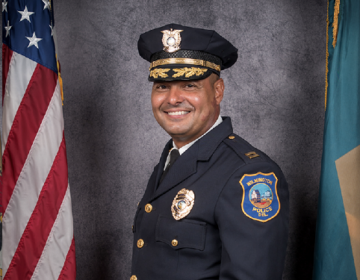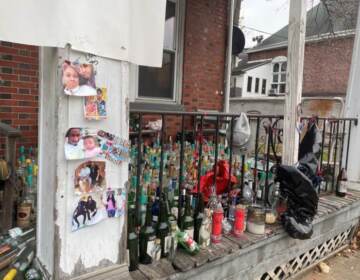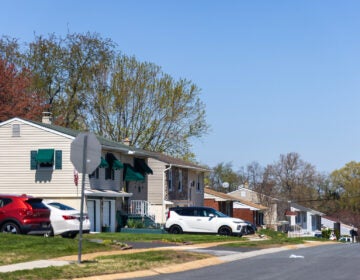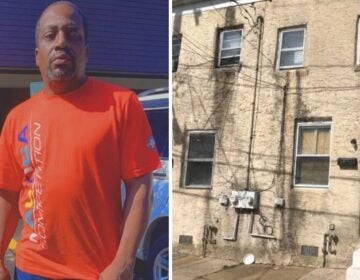‘This community is fed up’: Police Chief Campos looks to rebuild trust in Wilmington
The first Latino to be top cop in Delaware’s largest city is focused on building bonds with residents while reducing violence.
Listen 5:04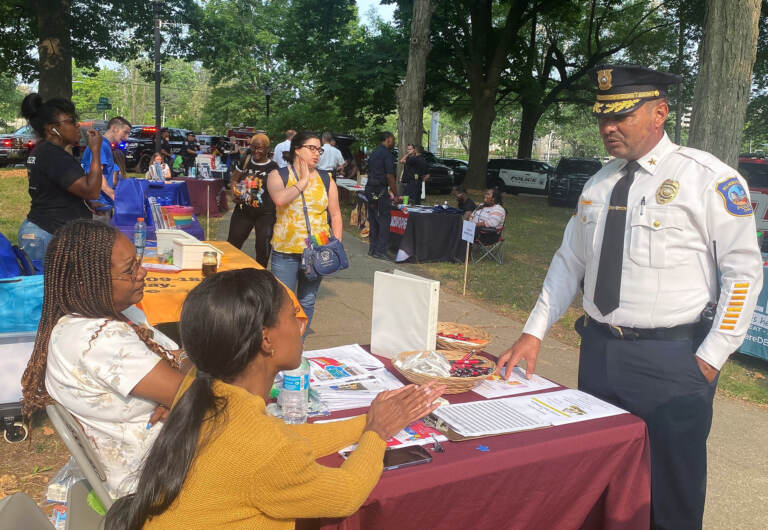
Chief Campos speaks with skeptics Candy Chapman (left) and Latoya Pendegrass at a community resource fair in Wilmington. (Cal Ransom/WHYY)
Wilmington police chief Wilfredo Campos was chatting with residents, officers, and vendors at a community resource fair this month when he encountered two women with an unflattering litany of complaints.
Campos, nearly six months into his tenure as top cop in Delaware’s largest city, told them to let loose.
“Not gonna hurt my feelings,” Campos told them.
Candy Chapman and Latoya Pendergrass peppered him with their concerns and questions, among them:
- The city cops don’t respond fast enough to murders and other serious situations.
- When they do arrive, even on non-emergency issues, officers don’t have positive interactions with residents or seem to care about the communities they get paid good money to serve.
- The cops do nothing when they see people struggling with substance use on the streets.
- Why isn’t the homicide unit reducing violence in a city where far too many people have been shot and killed, often in broad daylight?
Campos acknowledged some of their criticisms are legitimate, but beseeched them for patience and assistance while pointing out shootings continue to decline in the city of 72,000 that a 2014 Newsweek magazine article dubbed “Murder Town USA.”
“We didn’t get here overnight,” Campos said. “We’re not going to get through it overnight.”
The chief also explained his nearly 300 officers are working around the clock to forge alliances with residents while preventing and solving crimes.
Campos told Chapman and Pendergrass he’s aware more work must be done to rebuild trust, but that he’s holding the department to a high standard and won’t tolerate brutality.
Several city officers have been arrested in recent years for offenses such as rape, assault, narcotics possession, embezzlement, and tampering with evidence. In addition, two settlements with victims shot by police — including Jeremy McDole, a Black man who was fatally shot in his wheelchair by Wilmington police in 2015 — have cost the city more than $2 million.
Campos invited the pair to attend civic meetings to meet with him and their community engagement officers. He directed them to the WPD’s Facebook page and email alert service for information about outreach events, crimes, and arrests. He also gave them his business card.
“It seems like you’re a great guy,” Pendergrass said after a few minutes with Campos. “Thank you for coming over to introduce yourself and explain stuff.”
Chapman was more skeptical.
“The only thing is, we’ll see,” she said.
“And I like that answer,” Campos told Chapman. “You know why? I like to be held accountable and I’m not asking for an endorsement right now. All I’m asking for is time.”
‘We hear your concern, we work on your concern’
Campos became chief in January, when Mayor Mike Purzycki promoted the 26-year police veteran from captain, the force’s third-highest post. He’s the first Latino chief.
Campos, who grew up in Wilmington, was raised by a single mother in poverty. He was a standout shortstop on the McKean High baseball team. After graduating, he joined the Army Reserve and drove a DART bus before being hired as a city cop.
In a wide-ranging interview with WHYY News, the 50-year-old native of Puerto Rico said he’s honored to head the force in the town he moved to as a child. He stressed that he had paid his dues and has what it takes to reduce crime as the successor to Robert Tracy, who left after four years to become chief in St. Louis.
Campos didn’t duck questions about the challenges Wilmington faces while outlining the changes he hopes to implement and the ways he aims to build on Tracy’s initiatives to make Wilmington a safer place to live, work, and visit.
Campos said one significant change has been reinstating a Community Engagement Unit that Tracy had mothballed in a bid to have every member of the force be a community policing officer.
But Campos said too many neighborhood issues, such as a vacant or nuisance property, disputes between neighbors, and illegal dumping, require additional time and coordination and are best handled by an officer who truly knows the people who make up a neighborhood.
The unit’s nine officers don’t respond to 911 calls like other officers on patrol. Instead they work with residents on critical but non-emergency issues, and try to resolve them expeditiously.
“Nothing’s worse in a relationship than when someone gives you a problem and no one gets back to them for weeks or months,” Campos said. “You may be busy working on it, but if you don’t communicate, people feel like they’re not being listened to, and rightly so. So we’re making sure that we hear your concern, we work on your concern, we update you on what we’re doing. And hopefully we come to a resolution where it’s amicable and accepted by everyone.”
Corp. Semaja Bates, an eight-year police veteran, said she’s delighted to be in the unit.
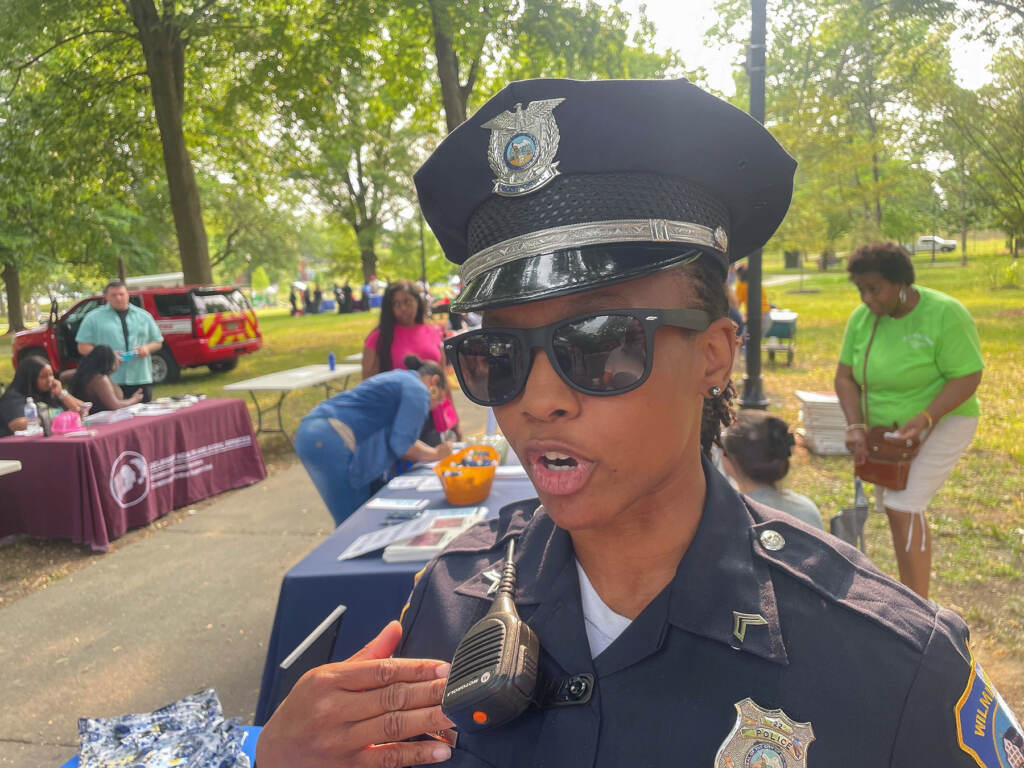
“When we go to community meetings, we find out people kind of want to get to know us a little bit,” Bates said.
“We’re out in the streets. We’re not bogged down by calls for service. So it gives us a little bit more time to be engaging with the community, just sitting down and having conversations, getting to know the different people that we are assigned to and build a relationship.”
Councilwoman Maria Cabrera applauded Campos for re-instituting the unit.
“They are walking the streets. They are talking to the community,” Cabrera said. “And that’s important, people seeing those police officers walking and talking to them.”
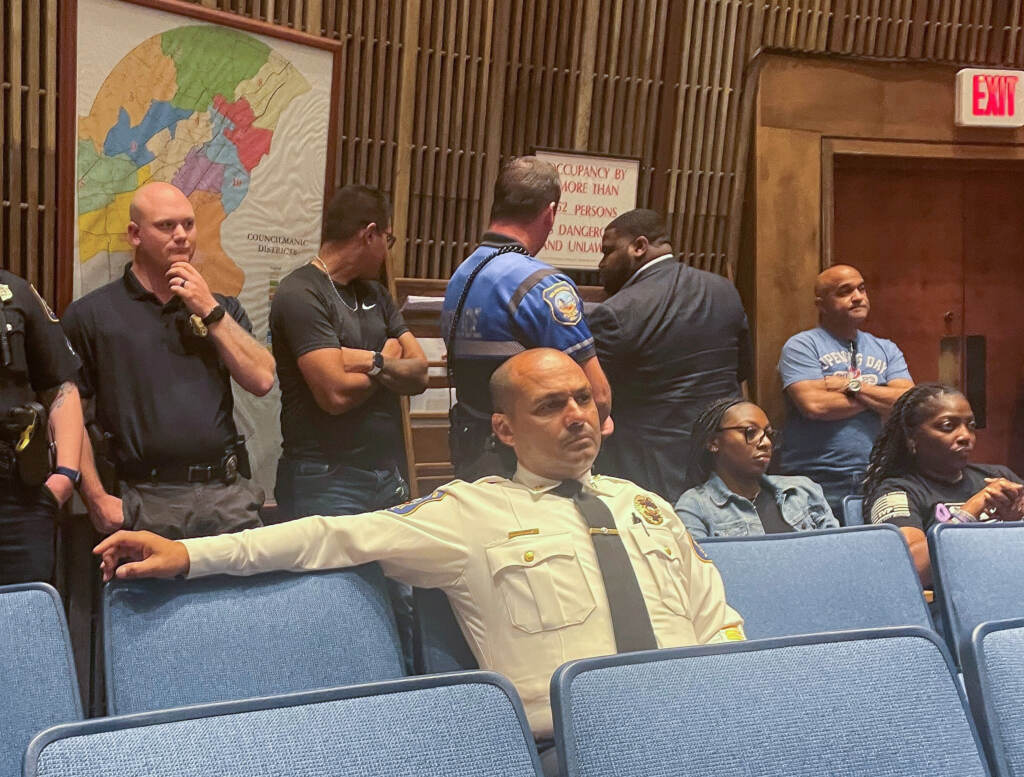
‘Perfection is, no one gets shot. No one gets killed’
On the violent crime front, Campos said the data-driven policing model known as CompStat that Tracy introduced to Wilmington continues to help officers track and map crimes and trends and get ahead of retaliatory shootings.
The chief also has continued a gun crime task force in partnership with federal authorities and the state Attorney General’s Office.
There’s also the Group Violence Intervention Program, in which people at high risk for victimization and violent offending are offered services to help keep them safe and offer a sense of stability.
Echoing Tracy, Campos said the cumulative goal of the anti-violence initiatives is to target the small percentage of people responsible for the violence.
“It’s going to continue,” the chief said. “Going after those individuals who have the highest propensity for violence — it’s not about disrupting a community, doing checkpoints. That doesn’t work. All that does is upset a community.”
During Tracy’s tenure, shootings initially rose but dropped dramatically from a record 202 victims in 2017 to 81 in 2018.
Gun violence rose sharply again during the COVID-19 pandemic, however, essentially doubling by 2021, when 152 people were shot and a record 39 people were killed on city streets.
Shootings fell again in 2022, when 107 people were shot, 17 of them fatally.
Through Wednesday, almost six months into 2023, a total of 49 people have been shot in Wilmington — five fatally. That’s slightly below 2022 figures.
While the positive trend has continued, Campos said every shooting is a tragic event, especially those that end in death.
“You know, one is too many,’ Campos said. “We want to always shoot for perfection. And perfection is, no one gets hurt. No one gets shot. No one gets killed.”
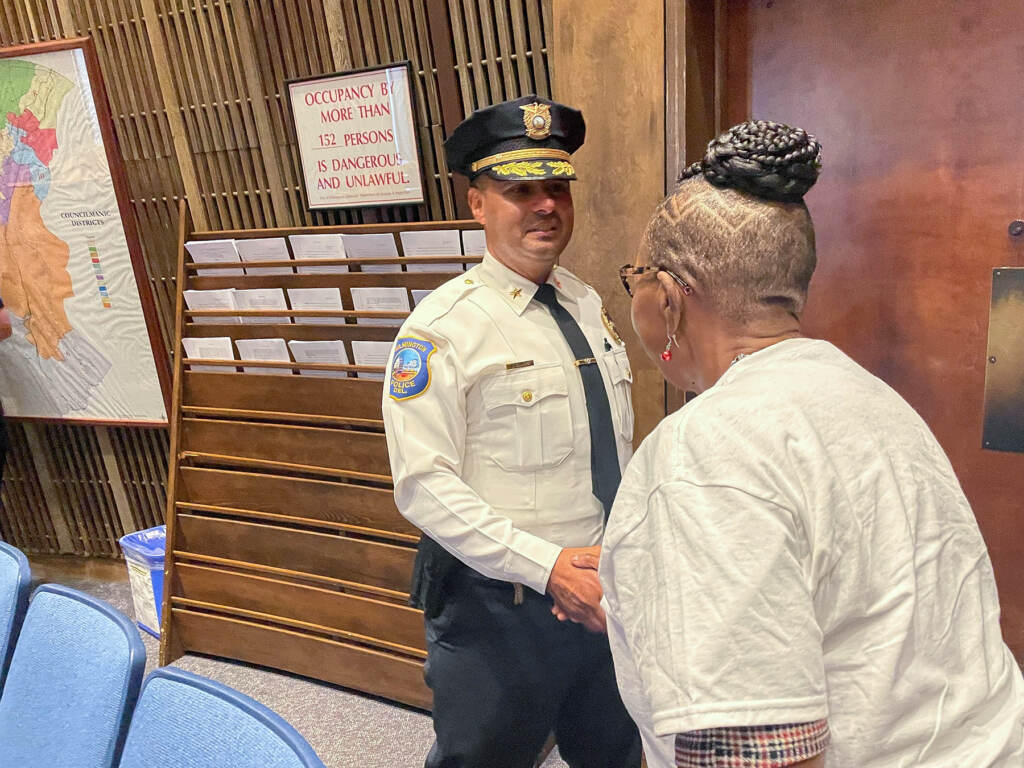
Connecting police officers with mental health technicians
While police reform advocates across the U.S. have called for social workers to respond to many 911 calls for service, that practice hasn’t been implemented in Wilmington.
That could soon change.
Campos says he’s working on collaborating with medical facilities to create a hybrid initiative by year’s end.
“I want to be able to build a program where I’m connecting police officers with mental health clinicians to go out and handle certain calls for service that deal with mental health,” the chief said. “It’s a tremendous need. You see the homelessness in some areas, people dealing with drug and alcohol addiction.”
Campos said he disagrees with those who don’t think police should concern themselves with social problems.
“We are out here for the community and that population is part of our community,” he said. “Policework evolves, right? And you have to evolve with what’s on the street.”
“You have people with addiction issues with the heroin pandemic. It’s all related, because you have people with addictions who now go out and do petty crime, shoplift, break into cars. And those are quality of life issues. And unless we address that, unless we address this population and try to get them some help, arresting our way out of it is not the answer.”
‘He doesn’t talk down to people. He talks with you.’
Councilwoman Zanthia Oliver, who represents the East Side neighborhood, an impoverished community struggling to contain violence, addiction, and homelessness, said Campos has done an admirable job.
“He’s coming to civic association meetings. He’s not just sending his guys,” said Oliver, Public Safety Committee vice chair. “He’s a hands-on type of guy, He’s talking to the community. He’s sharing what he wants to bring to the community.”
Oliver said she’s received positive feedback about the chief from residents and officers alike.

“I’ve heard from some of the officers that he’s just one of them,” Oliver said, “I think everybody feels like, ‘Oh, he’s one of us. He cares about us.’”
Oliver added that he’s also “listening to the community. Policing is not what it used to be. You’ve got to do some innovative things. He’s about community policing and he’s willing to work with outreach groups.”
At-large Councilwoman Maria Cabrera, who represents the whole city, was Wilmington’s first Latina elected official. She said Campos’s elevation to chief is a source of pride for Latinos, who comprise about 11% of the city population.
Campos said he’s honored to be the first Latino chief, “but as I always say, I’m here for everyone. I serve the whole city of Wilmington, which is very diverse.”

Cabrera agreed, and said what matters most is that Campos was raised in Wilmington.
“He grew up on the West Side. He experienced hardships, living in poverty, almost homelessness, being the son of a single mother,” Cabrera said. “He was determined from the time that he was a child to not live in that scenario, which happens to many families, through no fault of their own.”
Cabrera also cited the chief’s relaxed demeanor.
“He is just a pleasant, easy-to-speak-with person,” Cabrera said. “He gets it. He’s down to earth. He doesn’t talk down to people. He talks with you. That is important when it comes to relationships and how you interact with people.”
Cabrera said most officers also like Campos but all “respect him because of who he is, his work ethic. He is fair. He will do the right thing during these difficult times for public safety, police officers, and communities.”
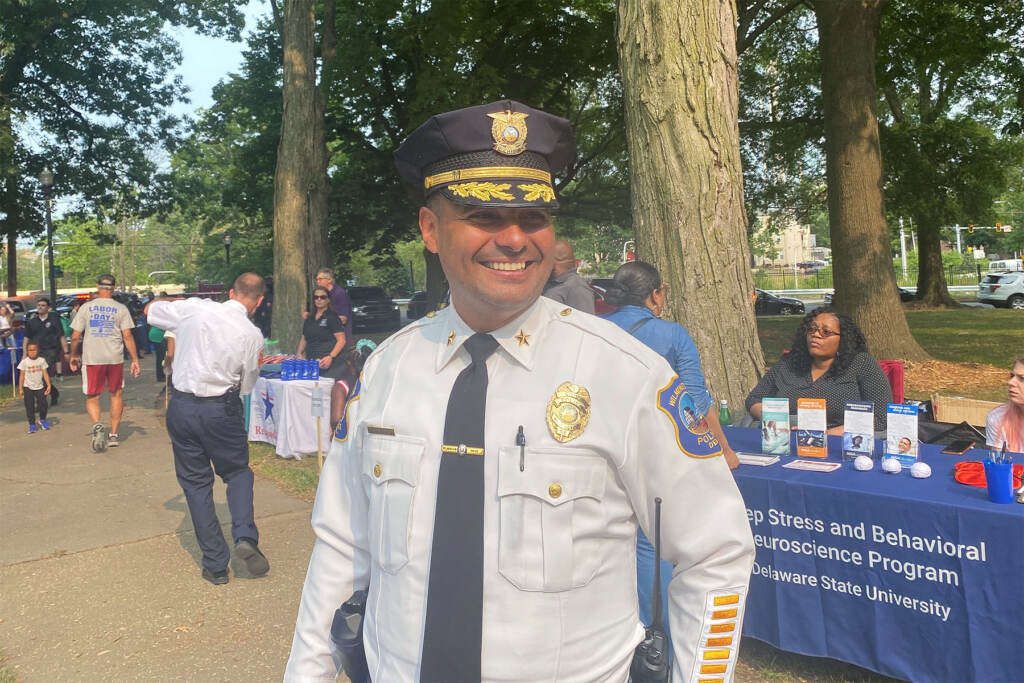
Chief’s message to gunmen: ‘We’re going to get you’
Kevin Kelley, a former City Council member, mayoral candidate, and parks director, said Campos has maintained his humility and humanity while steadily earning his way to the top of the police force, a job that carries the city government’s highest salary — $200,000.
“He hasn’t forgotten where he came from,’ Kelley said. “And he has a great ability to communicate with people, which is very helpful because people in many areas of the city don’t trust the police. After a couple of minutes of talking to him, you know he’s very genuine and he means well. We’ve got to give him a little time and see how he does.”
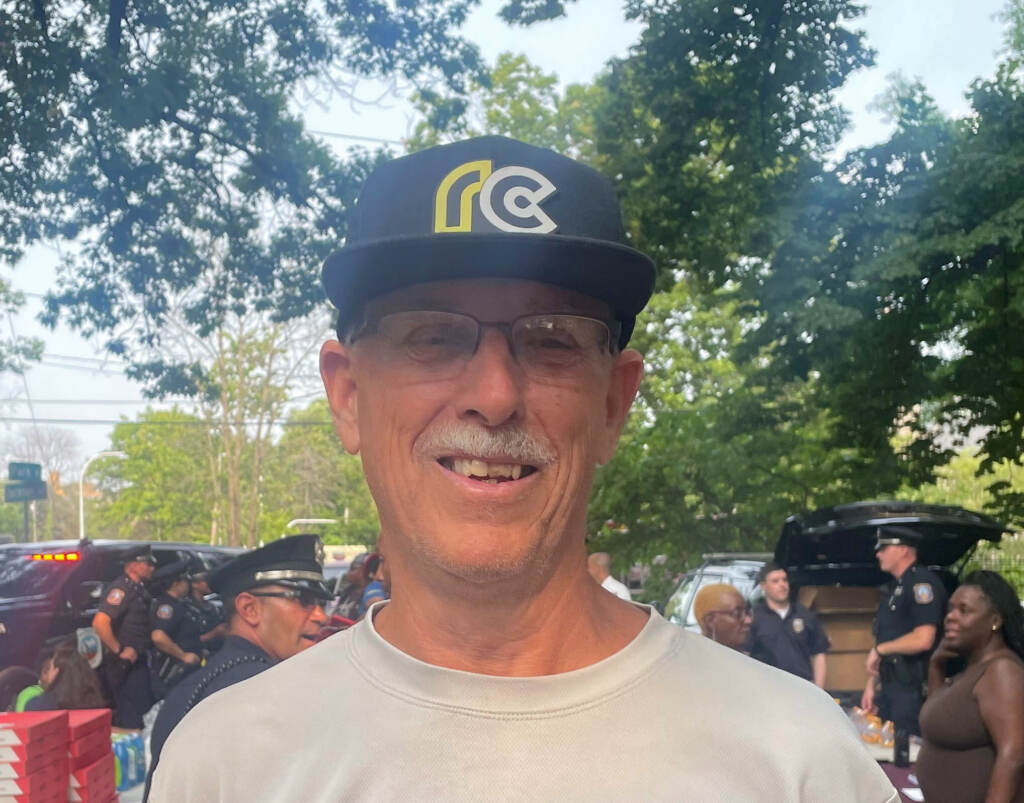
Jackie Kinard, whose two sons were shot and killed in Wilmington, said she’s hopeful for the chief, but stressed that the city’s problems are enormous. Residents need to feel like they can report issues and the cops will act expeditiously, she said.
“There’s a lot of this hanging out on these corners and stuff. They’re just loitering for no good reason at all. That by itself causes problems,” said Kinard, who pointed out that some gunmen spray bullets at crowds of people.
“When you have all these kids hanging out on the corners, they really shouldn’t be there,” she said. “They need to get better with that.”
Campos says he knows the reality of the streets and the corners where violent confrontations often start, and understands that far too many residents live in perpetual fear.
To would-be gunmen, the chief was clear.
“We know who you are,” he said. “We’re going to go out and we’re going to surgically target you. We’re going to get you.”
“We’re going to build up good cases and we’re going to put you away because this community is fed up. They’ve had enough with people going out here and shooting guns out here like you can do it and get away with it. That isn’t the case anymore.”
—
WHYY’s Cal Ransom contributed to this article.

Get daily updates from WHYY News!
WHYY is your source for fact-based, in-depth journalism and information. As a nonprofit organization, we rely on financial support from readers like you. Please give today.



